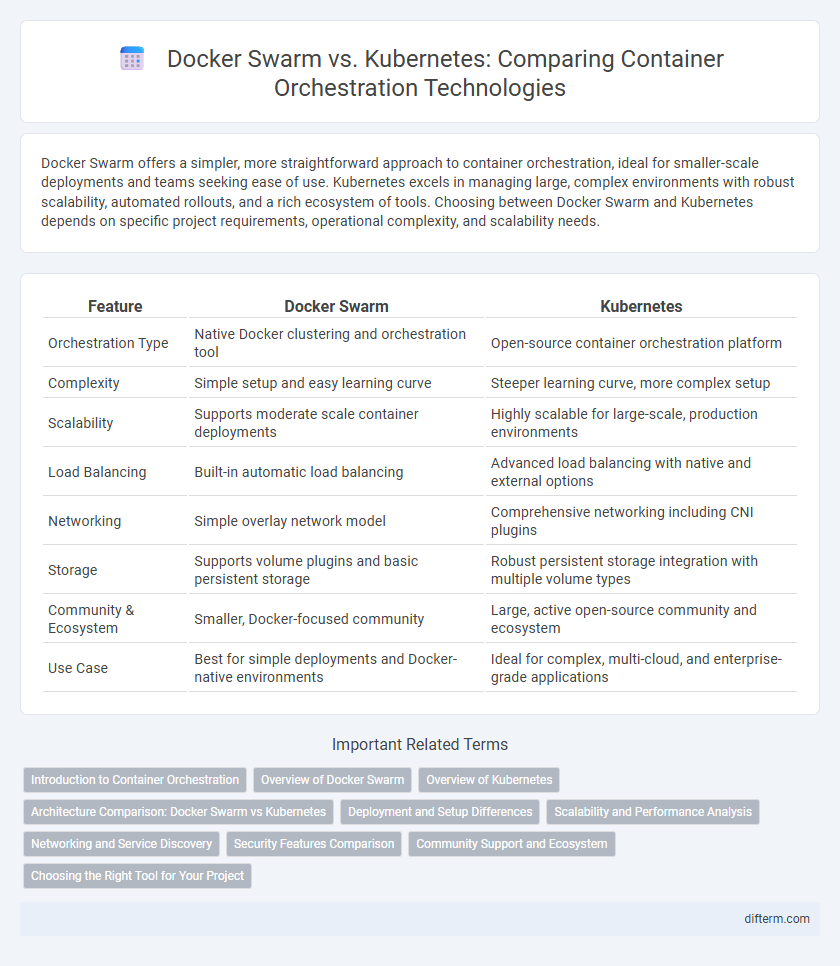Docker Swarm offers a simpler, more straightforward approach to container orchestration, ideal for smaller-scale deployments and teams seeking ease of use. Kubernetes excels in managing large, complex environments with robust scalability, automated rollouts, and a rich ecosystem of tools. Choosing between Docker Swarm and Kubernetes depends on specific project requirements, operational complexity, and scalability needs.
Table of Comparison
| Feature | Docker Swarm | Kubernetes |
|---|---|---|
| Orchestration Type | Native Docker clustering and orchestration tool | Open-source container orchestration platform |
| Complexity | Simple setup and easy learning curve | Steeper learning curve, more complex setup |
| Scalability | Supports moderate scale container deployments | Highly scalable for large-scale, production environments |
| Load Balancing | Built-in automatic load balancing | Advanced load balancing with native and external options |
| Networking | Simple overlay network model | Comprehensive networking including CNI plugins |
| Storage | Supports volume plugins and basic persistent storage | Robust persistent storage integration with multiple volume types |
| Community & Ecosystem | Smaller, Docker-focused community | Large, active open-source community and ecosystem |
| Use Case | Best for simple deployments and Docker-native environments | Ideal for complex, multi-cloud, and enterprise-grade applications |
Introduction to Container Orchestration
Container orchestration platforms like Docker Swarm and Kubernetes automate the deployment, scaling, and management of containerized applications across clusters of hosts. Docker Swarm offers native integration with Docker, simplifying setup and providing straightforward clustering features, while Kubernetes delivers advanced capabilities including self-healing, automated rollouts, and scaling with a more complex architecture. Both tools enhance operational efficiency in managing microservices and distributed systems, but Kubernetes is widely favored for large-scale, production-grade environments.
Overview of Docker Swarm
Docker Swarm is a native clustering and orchestration tool for Docker containers that enables users to create and manage a cluster of Docker nodes as a single virtual system. It offers straightforward setup, seamless integration with Docker CLI, and built-in load balancing to distribute container workloads efficiently across nodes. Docker Swarm emphasizes simplicity and ease of use, making it an ideal choice for small to medium-sized container deployments requiring quick orchestration without complex configurations.
Overview of Kubernetes
Kubernetes is an open-source container orchestration platform designed to automate the deployment, scaling, and management of containerized applications across clusters of hosts. It offers advanced features like self-healing, load balancing, automated rollouts and rollbacks, and secret management, making it ideal for complex, large-scale environments. Kubernetes supports multi-cloud and hybrid cloud architectures, providing flexibility and robustness for modern DevOps workflows.
Architecture Comparison: Docker Swarm vs Kubernetes
Docker Swarm features a simpler, native clustering architecture tightly integrated with Docker Engine, enabling straightforward deployment and management of containers through a decentralized manager-worker node model. Kubernetes employs a more complex, modular architecture consisting of master and multiple worker nodes with components like the API server, etcd datastore, controller manager, and scheduler, facilitating advanced orchestration, scalability, and high availability. While Docker Swarm emphasizes ease of setup and minimal configuration, Kubernetes prioritizes extensive functionality, fault tolerance, and robust ecosystem support for large-scale container orchestration.
Deployment and Setup Differences
Docker Swarm offers a straightforward deployment process with native integration into Docker CLI, enabling faster setup for container orchestration in smaller clusters. Kubernetes requires a more complex installation involving multiple components like kube-apiserver, scheduler, and controller-manager, making it better suited for large-scale, production-grade environments. The declarative configuration and extensive customization options in Kubernetes provide a robust framework for managing complex workloads compared to Docker Swarm's simpler, YAML-based service definitions.
Scalability and Performance Analysis
Docker Swarm provides straightforward scalability with rapid container orchestration suitable for smaller to medium deployments, utilizing a decentralized architecture that reduces latency in service discovery. Kubernetes offers advanced scalability features, handling thousands of nodes with fine-grained resource management and load balancing, making it ideal for large-scale, complex applications. Performance analysis shows Kubernetes excels in fault tolerance and auto-scaling capabilities, whereas Docker Swarm delivers quicker setup times and less overhead in lightweight environments.
Networking and Service Discovery
Docker Swarm provides built-in networking features with automatic load balancing through an overlay network that simplifies container communication across nodes, using DNS-based service discovery. Kubernetes offers a more advanced networking model with the Container Network Interface (CNI) plugins, enabling pod-to-pod communication via flat IP addressing and robust service discovery with CoreDNS for scalable, resilient cluster management. Kubernetes' network policies allow fine-grained control over traffic flows, while Docker Swarm prioritizes ease of use with integrated service discovery and simpler networking setup.
Security Features Comparison
Docker Swarm employs mutual TLS encryption for secure node communication and offers built-in role-based access control (RBAC) to restrict user permissions. Kubernetes enhances security with advanced features such as network policies for pod-level traffic control, Pod Security Policies enforcing security contexts, and integration with external identity providers for robust authentication. Both platforms support secret management, but Kubernetes provides more granular controls and extensive audit logging capabilities to ensure comprehensive security compliance.
Community Support and Ecosystem
Kubernetes boasts a larger and more active community, with extensive contributions from major cloud providers like Google, Microsoft, and AWS, driving robust ecosystem growth. Docker Swarm offers simplicity and ease of use but has a smaller, less vibrant community, resulting in fewer third-party integrations and fewer advancements. The Kubernetes ecosystem includes a rich set of native tools, plugins, and third-party solutions, making it the preferred choice for enterprise-scale container orchestration.
Choosing the Right Tool for Your Project
Docker Swarm offers simplicity and ease of setup, making it ideal for small to medium-sized projects that require rapid deployment and straightforward orchestration. Kubernetes provides advanced features like automated scaling, self-healing, and extensive ecosystem support, which are crucial for complex, large-scale applications demanding high reliability and flexibility. Evaluating factors such as project size, team expertise, and specific workload requirements can guide the decision between Docker Swarm's user-friendly approach and Kubernetes' robust capabilities.
Docker Swarm vs Kubernetes Infographic

 difterm.com
difterm.com